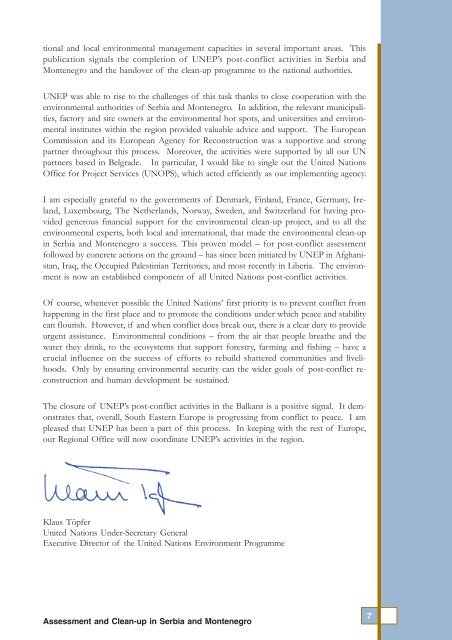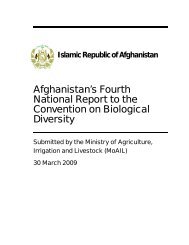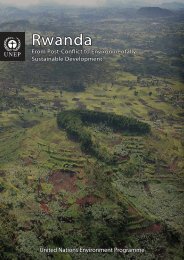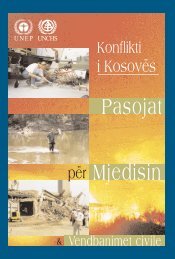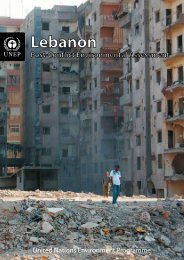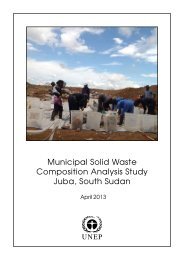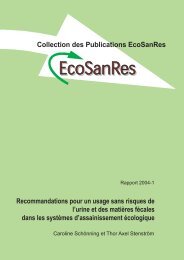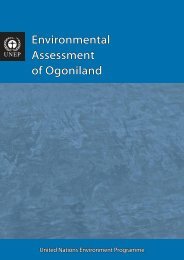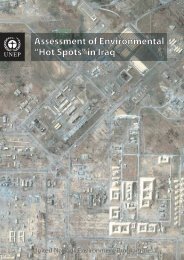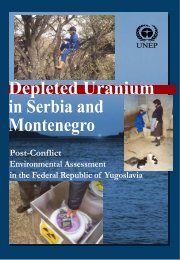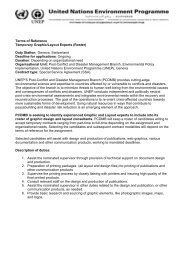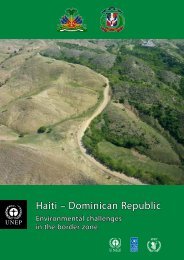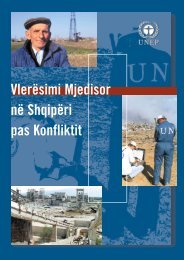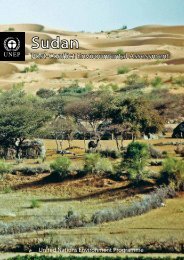From Conflict to Sustainable Development From Conflict to ...
From Conflict to Sustainable Development From Conflict to ...
From Conflict to Sustainable Development From Conflict to ...
You also want an ePaper? Increase the reach of your titles
YUMPU automatically turns print PDFs into web optimized ePapers that Google loves.
tional and local environmental management capacities in several important areas. This<br />
publication signals the completion of UNEP’s post-conflict activities in Serbia and<br />
Montenegro and the handover of the clean-up programme <strong>to</strong> the national authorities.<br />
UNEP was able <strong>to</strong> rise <strong>to</strong> the challenges of this task thanks <strong>to</strong> close cooperation with the<br />
environmental authorities of Serbia and Montenegro. In addition, the relevant municipalities,<br />
fac<strong>to</strong>ry and site owners at the environmental hot spots, and universities and environmental<br />
institutes within the region provided valuable advice and support. The European<br />
Commission and its European Agency for Reconstruction was a supportive and strong<br />
partner throughout this process. Moreover, the activities were supported by all our UN<br />
partners based in Belgrade. In particular, I would like <strong>to</strong> single out the United Nations<br />
Office for Project Services (UNOPS), which acted efficiently as our implementing agency.<br />
I am especially grateful <strong>to</strong> the governments of Denmark, Finland, France, Germany, Ireland,<br />
Luxembourg, The Netherlands, Norway, Sweden, and Switzerland for having provided<br />
generous financial support for the environmental clean-up project, and <strong>to</strong> all the<br />
environmental experts, both local and international, that made the environmental clean-up<br />
in Serbia and Montenegro a success. This proven model – for post-conflict assessment<br />
followed by concrete actions on the ground – has since been initiated by UNEP in Afghanistan,<br />
Iraq, the Occupied Palestinian Terri<strong>to</strong>ries, and most recently in Liberia. The environment<br />
is now an established component of all United Nations post-conflict activities.<br />
Of course, whenever possible the United Nations’ first priority is <strong>to</strong> prevent conflict from<br />
happening in the first place and <strong>to</strong> promote the conditions under which peace and stability<br />
can flourish. However, if and when conflict does break out, there is a clear duty <strong>to</strong> provide<br />
urgent assistance. Environmental conditions – from the air that people breathe and the<br />
water they drink, <strong>to</strong> the ecosystems that support forestry, farming and fishing – have a<br />
crucial influence on the success of efforts <strong>to</strong> rebuild shattered communities and livelihoods.<br />
Only by ensuring environmental security can the wider goals of post-conflict reconstruction<br />
and human development be sustained.<br />
The closure of UNEP’s post-conflict activities in the Balkans is a positive signal. It demonstrates<br />
that, overall, South Eastern Europe is progressing from conflict <strong>to</strong> peace. I am<br />
pleased that UNEP has been a part of this process. In keeping with the rest of Europe,<br />
our Regional Office will now coordinate UNEP’s activities in the region.<br />
Klaus Töpfer<br />
United Nations Under-Secretary General<br />
Executive Direc<strong>to</strong>r of the United Nations Environment Programme<br />
Assessment and Clean-up in Serbia and Montenegro<br />
7


